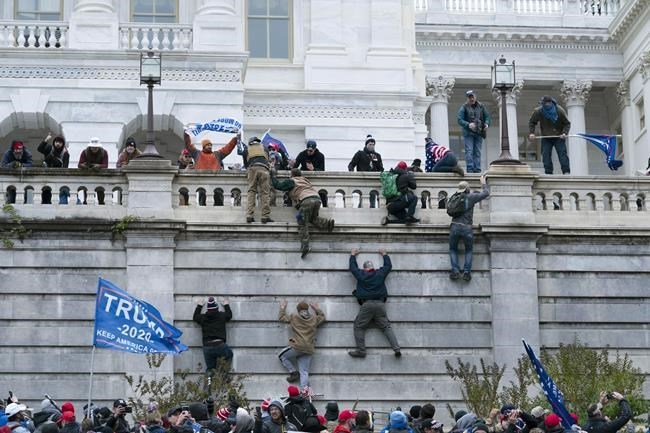
FILE - Supporters of President Donald Trump climb the west wall of the the U.S. Capitol in Washington, Jan. 6, 2021. (AP Photo/Jose Luis Magana, File)
January 17, 2025 - 12:09 PM
WASHINGTON (AP) — The federal judge who oversaw Donald Trump's 2020 election interference case denounced efforts to rewrite the history of the U.S. Capitol attack Friday as she handed down what she acknowledged may be one of the final punishments for the Jan. 6 riot before the Republican president-elect's promised pardons.
In the courthouse within view of the Capitol days before Trump is set to take office, U.S. District Judge Tanya Chutkan acknowledged the Virginia man she was sentencing may never actually serve his 10-day prison term for his role in the riot. But Chutkan said she would not let talk of pardons impact decisions in her courtroom, telling the defendant: “There have to be consequences.”
“I only wish the rest of the country could see what I've seen," Chutkan said before sentencing Brian Leo Kelly, who pleaded guilty to misdemeanor offenses. She rejected the portrayal of the rioters as peaceful protesters as “nonsense," arguing that even those who didn't engage in violence and destruction were part of an effort to stop the peaceful transfer of power.
“I know what happened,” said Chutkan, who was nominated to the bench by Democratic President Barack Obama. “I can't say it won't happen again.”
In the weeks since Trump's victory over Vice President Kamala Harris, the judges overseeing the more than 1,500 criminal cases against the Trump supporters who stormed the Capitol have continued accepting guilty pleas, presiding over trials and handing out sentences, even as some judges have alluded the fact that the largest prosecution in Justice Department history is likely nearing an abrupt end.
Nearly 1,300 of the defendants have pleaded guilty or been convicted by a judge or jury after trials to charges including seditious conspiracy and assaulting police officers with dangerous weapons. Over 1,000 of them have been sentenced, with roughly two-thirds getting prison terms ranging from several days to 22 years.
Trump has cast the rioters as “patriots” and “hostages" he contends have been unfairly treated by the same Justice Department that prosecuted him in two cases, which have since been dismissed.
Trump has repeatedly sought to downplay the violence that was captured on camera as members of the angry mob pushed past police barriers, shattered windows and attacked police with flagpoles and other makeshift weapons while Congress met to certify Democrat Joe Biden's 2020 election victory.
But the scope of the potential pardons for the Jan. 6 defendants remains unclear. Trump has said he will look at defendants on a case-by-case basis, but he has not explained how he will decide who receives such relief. Vice President-elect JD Vance recently said: “If you committed violence on that day, obviously you shouldn’t be pardoned.” But he later added there was a “bit of gray area” in some cases.
Several Jan. 6 sentencings took place Friday as Chutkan presided over the case against Kelly, who remained inside the Capitol for about 36 minutes, ignoring police commands to leave the building, according to prosecutors. Kelly, 57, of Fairfax Station, Virginia, used his cellphone to record images of the riot, “treating the unfolding events as a spectacle,” prosecutors said.
Kelley's lawyer noted in court papers that his client didn't participate in any violence or destruction, and realized “the gravity of the situation as soon as he entered the Rotunda.” Kelly told Chutkan he was only there to support Trump — not to "uprise and go against" the government.
In a different case in the courtroom next door, U.S. District Judge Amit Mehta handed down a year-long prison sentence to the former general counsel for the Oath Keepers and a close associate of the far-right extremist group's founder Stewart Rhodes. Kelley SoRelle, 45, of Granbury Texas, pleaded guilty to obstructing justice for encouraging others to destroy electronic evidence.
SoRelle was photographed outside the Capitol with Rhodes, who was sentenced to 18 years in prison after being convicted of seditious conspiracy for what prosecutors described as a violent plot to stop the peaceful transfer of power. During the riot, SoRelle posted a chat message for other Oath Keepers that said, “We are acting like the founding fathers — can’t stand down. Per Stewart, and I concur.”
SoRelle’s case remained suspended for months amid questions about her mental health. She described having delusional thoughts before she was admitted to the federal Bureau of Prisons in November 2023 for a competency evaluation and released several months later.
In a tearful statement to the judge, SoRelle said she deeply regrets her association with Rhodes and the Oath Keepers, and rejects anything other than following the “peaceful electoral process.”
Mehta, another Obama appointee, described SoRelle's actions as an attempt to cover up among “the most serious conduct Americans can commit: sedition." Mehta didn't mention the potential pardons coming under the Trump administration. But, the judge said he hoped the events of Jan. 6 will not be forgotten “anytime soon."
___
News from © The Associated Press, 2025